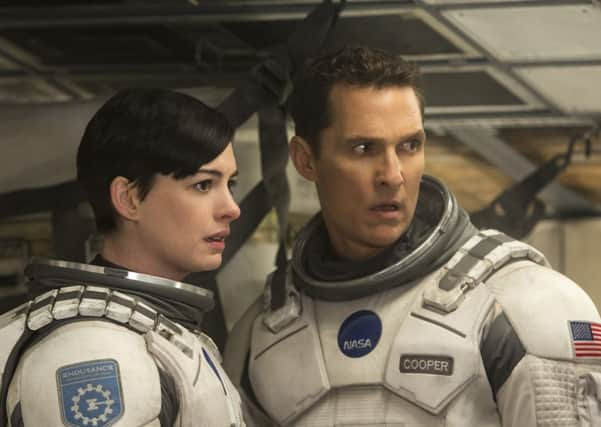Can sci-fi blockbusters inspire the next generation of physicists and chemists?


When I was a child, just about all the important film directors were American. Perhaps that’s why it’s so reassuring to see a London graduate’s name on the billboards - British born filmmaker, Christopher Nolan, who has received rave reviews for his dazzling new science fiction epic, Interstellar.
When I was a child, just about all the important film directors were American. Perhaps that’s why it’s so reassuring to see a London graduate’s name on the billboards - British born filmmaker, Christopher Nolan, who has received rave reviews for his dazzling new science fiction epic, Interstellar.
Advertisement
Hide AdAdvertisement
Hide AdCritics have pointed to a screenplay littered with geeky references and Nolan himself has spoken of his desire to inspire the next generation. I’m undoubtedly prejudiced, but if I hadn’t been weaned on a steady diet of warp speed and people who like to switch all power to front deflector shields, I might not be the person I am today.
I’m not alone either. Most of the students on my physics degree were committed sci-fi fans and in the corridors of NASA, people openly admit to having been inspired by Mr Spock.
My own scientific education began in earnest on the day I first caught sight of The Six Million Dollar Man. Within days, children everywhere were running around the playground in slow motion and there was always some idiot by the bike sheds who thought he actually was bionic.
“Actually, I am bionic,” this seven year old used to whisper, as if he was revealing an entirely new secret each morning. “But it’s a government secret,” he added, veering across the asphalt in slow motion, “So don’t tell anybody.” Incidentally, that last line usually had a Doppler shift and I always used to think that was a nice touch. A decade later, I watched a desperate physics teacher try to interest his class in the Doppler effect and fail very badly. At that moment it hit me just how powerful a force science fiction can be.
Advertisement
Hide AdAdvertisement
Hide AdLee Majors may not have been a great actor, but as Steve Austin he projected new concepts into the mind of every seven year old in the country. Every week there was some new sort of malfunctioning computer or incoming meteorite that he had to deal with. Up until the age of nine, I assumed it was a documentary. And then, sadly, times changed, sci-fi fell out of fashion and was banished from the schedules along with genuinely informative programmes like Tomorrow’s World.
It wasn’t until the release of the Hollywood blockbuster, Iron Man, in 2008 that the spirit of Steve Austin was disinterred. Not only did Robert Downey’s character create the gadgets, he also got to play with them. This combined with persistent attention of Gwyneth Paltrow ought to be enough to turn any red blooded 12 year old towards a career in the applied sciences.
For too long the studious men in white coats have been forced to stand on the side lines whilst some lucky tough guy gets to fly around in his car. Think Q versus James Bond. Think Morgan Freeman versus Christian Bale’s Batman.
If sci-fi is going to inspire the next wave of scientists, then the clever people must be seen to be having a good time. Thankfully, in Interstellar there is a more proactive role for the brains of the piece. Not only does Matthew McConaughey get to fly the space ship, he also gets to share it with Ann Hathaway.
Advertisement
Hide AdAdvertisement
Hide AdWhen we look at the failings of the modern education system, one of the biggest challenges is to capture the attention of the children who aren’t interested and for teenage boys in particular, science fiction can unlock a whole other world. Whichever way you play it, the beauty of the best science fiction remains the idea, one which can capture the imagination like no other.
With Britain becoming increasingly reliant on important scientific talent, it’s foolish to ignore what the genre represents. It is a clear bridge between the artistic and scientific worlds and it’s a vision of a future we might want to live in.
• Steven Cutts is a doctor and writer from Barnsley. His novel, Viking Village, is available on Kindle.